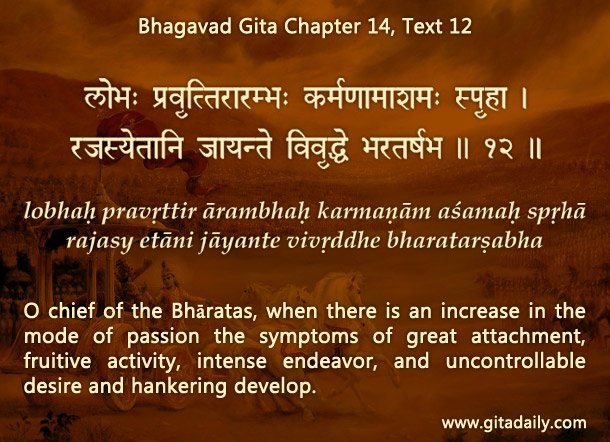Suppose a child, on seeing an adult lift a heavy weight, tries to lift a similar weight. That child will end up injured, unable to lift even small weights.
Just as different people have different weight-lifting capacities, so too different people have different work-lifting capacities.
We may, on seeing others do a lot and achieve a lot, take up workloads way beyond our capacity. That unmanageable burden sets us up for stress, irritability and failure. Such negative experiences may demoralize us so much that we cripple our confidence about doing even small, achievable things and lose our self-esteem.
The Bhagavad-gita (14.12) indicates that the urge to do more and get more stems from excessive influence of the mode of passion. And it (14.16) cautions that such passion leads to tribulation.
Does this mean that we shouldn’t strive to increase our capacity? No, it means that we need to increase it gradually, through manageable steps – as we would increase our weight-lifting capacity.
To assess our present capacity, be it in professional, emotional, relational or other fields, we need to situate ourselves, at least during the assessment, in the mode of goodness. The Gita (14.11) states that goodness is characterized by the illumination of knowledge, wherein we discern what we can do and, more importantly, what is worth doing.
To rise to goodness, the most expeditious way is bhakti-yoga. It connects our consciousness with the supreme transcendental reality, Krishna, thereby elevating our consciousness to goodness and higher to transcendence. Further, when we infuse our aspirations with a devotional service attitude, Krishna often empowers us to extend our capacities so that we can maximize our service to him.
Thus, by mature, dispassionate discernment, we can channel our passion not destructively, but constructively, thereby doing justice to our talents and optimizing our contributions.
To know more about this verse, please click on the image
Explanation of article:
Podcast:


To be successful,you should underestimate yourself
Need to situate oneself in goodness to discriminate what to do and how much to do. This is real life application this sloka. Thank you
Thanks for the thoughtful comment, Anand P
ys
ccdas